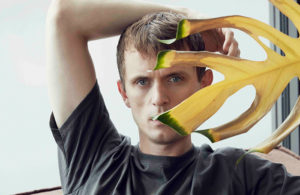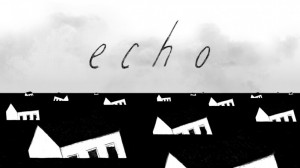All Of Us Girls Have Been Dead For So Long is a DIY play about the climate apocalypse and sexy dead things. The event takes place over two nights in July, as part of the I,I,I,I,I,I,I Kathy Acker group exhibition live program at London’s ICA and is a major development of an earlier collaboration by artists Linda Stupart and Carl Gent. Performed in 2018, Echo was a dramatic representation of the 1992 Ecco the Dolphin Sega Mega Drive video game, incorporating narrative elements based on Naomi Klein’s reportage on the BP Deepwater Horizon oil spill. The new production ramps up Echo’s scope and ambition by recruiting a host of artists and long-term collaborators as actors, musicians and tech support, including writers, researchers, artists and a sign language interpreter.
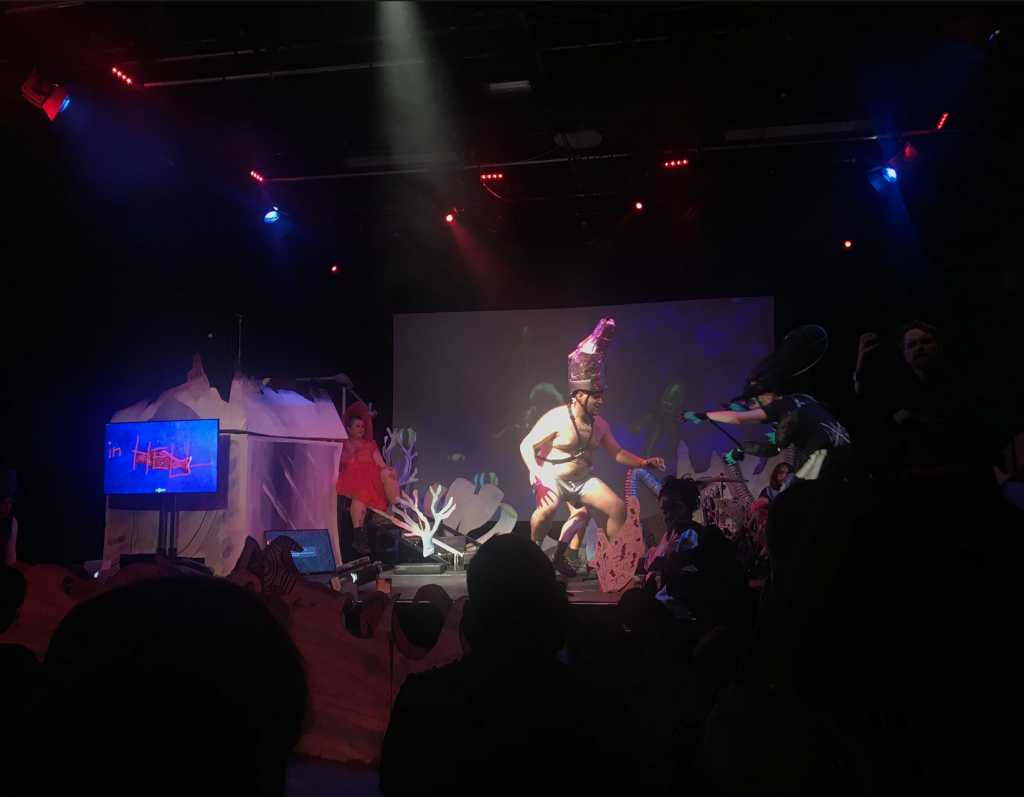
On arrival at the sold out ICA theatre, each member of the audience finds a Fortune Teller Miracle Fish plastic sachet on their chair. In lieu of the regular, flimsy red sea creature, the sachet contains a folded piece of recycled paper featuring the production credits of Stupart and Gent’s play. On the back of the flyer, a couple of lines from Klein’s 2014 book, This Changes Everything: Capitalism vs. the Climate which, alongside Kathy Acker’s 1996 novel Pussy, the King of Pirates, provides the literary inspiration behind the artists’ play. But really, no fish inside the sachet? Apparently, it has slipped from its usual confines and made for the stage. Animated by Stupart in a sleeveless, floating, see-through red dress with matching headgear, Fortune Teller Miracle Fish acts as the narrator of the play.
The stage design embodies the two London-based artists’ trademark queer anti-art aesthetics. There are cardboard cut-outs of waves, icebergs and coral at the front and back of the stage. A drum kit has been sunk into the right-hand corner. A large backscreen shows a baby pink video of what—based on an association easily made with one of the Klein quotes, “the herring were in their egg and larval stages”—appear to be hatching fish. The reproductive video alternates with classic, pixelated Ecco the Dolphin graphics.
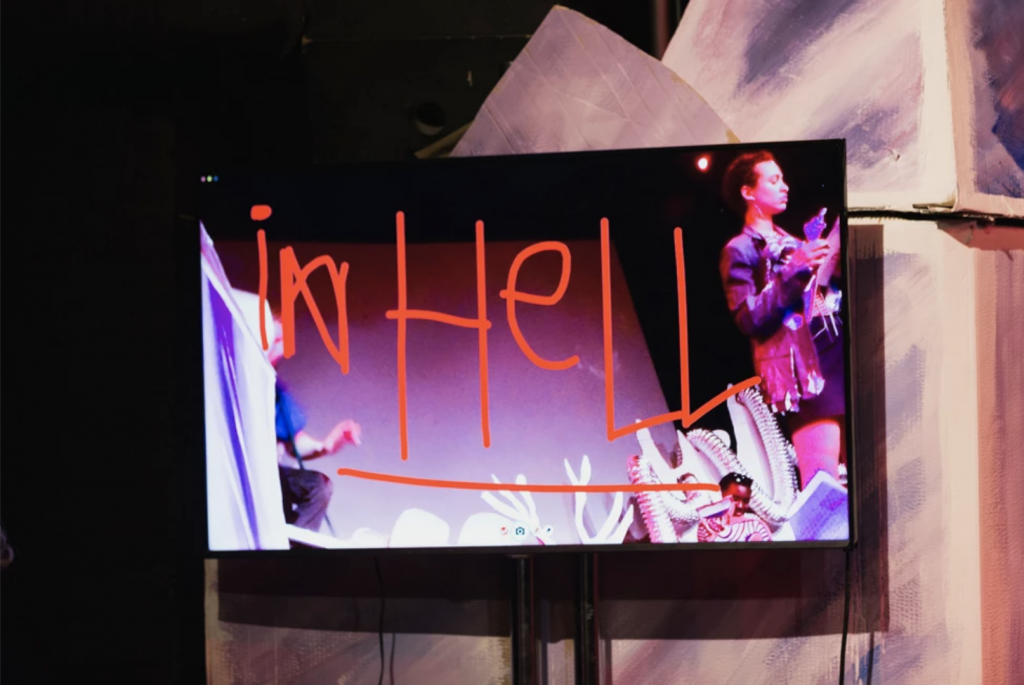
Writer, artist and fag tips founder, Virgil B/G Taylor as Ecco delivers the stand-out performance. Largely naked, they look like they were born wearing silver shorts and a leather harness. The latter is used to strap an alu-foiled dorsal fin to the performer’s back but, on Taylor, it insinuates something queerer; bondage-related. A high, silver dolphinesque headpiece completes the costume. For the duration of the play, Taylor is living their role. Squealing and swaying their body in perfectly (per)formed sinus waves, they’re just a dolphin moving about. Just ~travelling~.
Despite the overall mood being ‘multisensory’, there is a plot courtesy of the Ecco the Dolphin video game. In it, Ecco is separated from his pod, which is carried away in a vortex during a major storm. He now must navigate his way through a world changed as a result of this cataclysmic event. Taylor’s Ecco is on a similar mission, an odyssey through the underworld. En route, they encounter a shedload of life, including researcher Kelechi Anucha’s singing Orca, Clémentine Bedos’ Woman (one of Acker’s Pussy, the King of Pirates’ dead girls, resurrected), and one of the oldest creatures on Earth, the Greenland Shark, played by Gent in a velvet gown. Digital Ecco eventually learns that the storm was caused by the extra-terrestrial Vortex Queen who syphons resources off the planet like a venture capitalist. Played by Sam Keogh, she appears in the final act and looks like the killer extraterrestrial from the Alien franchise, which, as turns out, is true to the Ecco the Dolphin rendering.
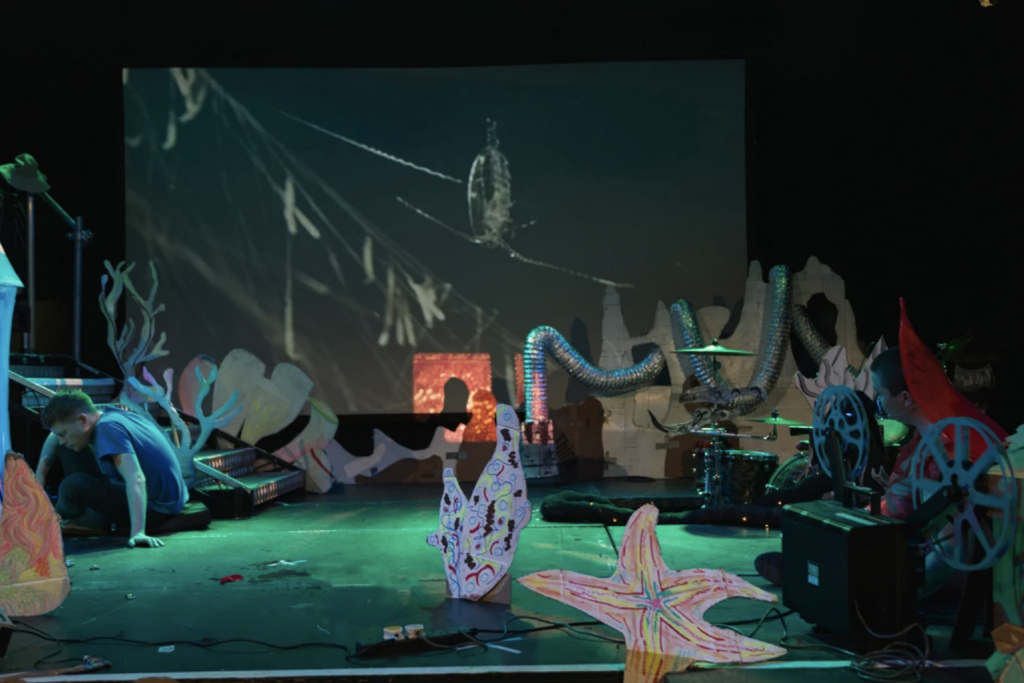
The soundtrack to All Of Us Girls Have Been Dead For So Long is taken from the Sega video game and pop vocal group Westlife respectively, with original contributions by vocalist Anucha, Andrew Ferguson on drums and amplified sitar duo Perple Celotape with Gent. Intense sections, like Taylor squealing against a backdrop of hectic drumming, or a wailing song delivered by Anucha’s Orca, alternate with the more minimal synth whistling from Ecco the Dolphin. The play ends with a singalong to Westlife’s 1999 version of Jacques Brel and Rod McKuen’s pop song ‘Seasons In The Sun’. Its lyrics, “we had joy, we had fun, we had seasons in the sun,/ but the wine and the song, like the seasons have all gone” take on an unexpectedly apocalyptic meaning in the context of the climate crisis narrative.
In 1974, experimental performance duo The Kipper Kids provoked a scandal. What started with them sitting on stage, equipped with what performance theorist Dominic Johnson describes as “big earphones, little hand-held mirrors, rubber bands and suitcases”, ended with the performers bashing an ICA audience member in the corridor and the police coming in from The Mall. Sans the literal violence, All Of Us Girls Have Been Dead For So Long evokes a history of radical plays and performances that has become a part of ICA legend. Not only that, but Stupart and Gent’s play propels that history into a queerer, if not brighter future.**
The I, I, I, I, I, I, I, Kathy Acker group exhibition is on at London’s ICA, running May 1 to August 4, 2019.
